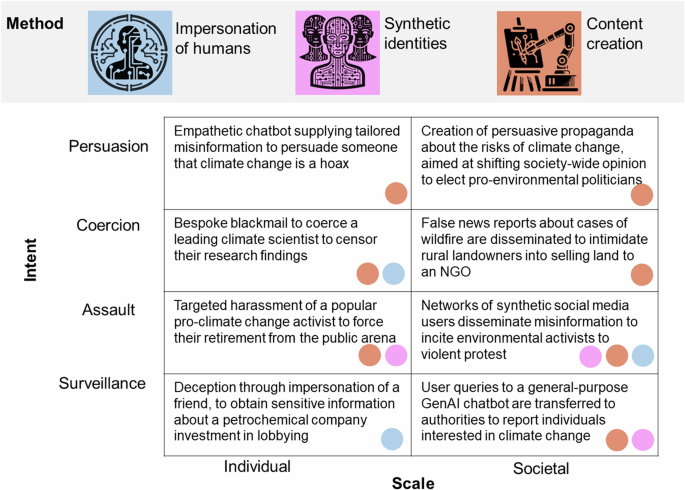Bai, H., Voelkel, J., Eichstaedt, J. & Willer, R. Artificial Intelligence Can Persuade Humans on Political Issues. https://doi.org/10.31219/osf.io/stakv (2023).
Brundage, M. et al. The Malicious Use of Artificial Intelligence: Forecasting, Prevention, and Mitigation. (2018).
Ferrara, E. GenAI against humanity: nefarious applications of generative artificial intelligence and large language models. J Comput Soc Sci https://doi.org/10.1007/s42001-024-00250-1 (2024).
Galaz, V. et al. Climate Misinformation in a Climate of Misinformation. (2023).
Richards, D., Worden, D., Song, X. P. & Lavorel, S. Harnessing generative artificial intelligence to support nature‐based solutions. People and Nature https://doi.org/10.1002/pan3.10622 (2024).
Filatova, T., Verburg, P. H., Parker, D. C. & Stannard, C. A. Spatial agent-based models for socio-ecological systems: Challenges and prospects. Environ. Model. Softw. 45, 1–7 (2013).
Archie, K. M., Chapman, R. & Flood, S. Climate change response in New Zealand communities: Local scale adaptation and mitigation planning. Environ. Dev. 28, 19–31 (2018).
Harvey, C. A. et al. Climate-Smart Landscapes: Opportunities and Challenges for Integrating Adaptation and Mitigation in Tropical Agriculture. Conserv Lett. 7, 77–90 (2014).
Pearce, W., Brown, B., Nerlich, B. & Koteyko, N. Communicating climate change: conduits, content, and consensus. WIREs Clim. Change 6, 613–626 (2015).
Oreskes, N. & Conway, E. Merchants of Doubt: How a Handful of Scientists Obscured the Truth on Issues from Tobacco Smoke to Global Warming. (Bloomsbury Publishing, USA, 2011).
Boykoff, M. T. & Boykoff, J. M. Climate change and journalistic norms: A case-study of US mass-media coverage. Geoforum 38, 1190–1204 (2007).
d’I. Treen, K. M., Williams, H. T. P. & O’Neill, S. J. Online misinformation about climate change. WIREs Climate Change 11, (2020).
Zuidijk, D. Deepfakes in Slovakia Preview How AI Will Change the Face of Elections. Bloomberg https://www.bloomberg.com/news/newsletters/2023-10-04/deepfakes-in-slovakia-preview-how-ai-will-change-the-face-of-elections (2023).
Weaver, M. AI chatbot ‘encouraged’ man who planned to kill queen, court told. The Guardian https://www.theguardian.com/uk-news/2023/jul/06/ai-chatbot-encouraged-man-who-planned-to-kill-queen-court-told (2023).
Berger, I. Misinformation about recent whale deaths dominated discussions of offshore wind energy on Facebook. Media Matters https://www.mediamatters.org/facebook/misinformation-about-recent-whale-deaths-dominated-discussions-offshore-wind-energy (2023).
Fredheim, R. & Pamment, J. Assessing the risks and opportunities posed by AI-enhanced influence operations on social media. Place Branding and Public Diplomacy https://doi.org/10.1057/s41254-023-00322-5 (2024).
Gecsoyler, S. BBC presenter’s likeness used in advert after firm tricked by AI-generated voice. The Guardian https://www.theguardian.com/technology/2024/apr/28/bbc-presenters-likeness-used-in-advert-after-firm-tricked-by-ai-generated-voice (2024).
Civitai Inc. Civitai: the home of open-source generative AI. https://civitai.com/ (2024).
Lloro-Bidart, T. An ecofeminist account of cyberbullying: Implications for environmental and social justice scholar-educator-activists. J. Environ. Educ. 49, 276–285 (2018).
Wei, Y., Zhu, Y., Hui, P. & Tyson, G. Exploring the Use of Abusive Generative AI Models on Civitai. in Proceedings of the 32nd ACM International Conference on Multimedia 6949–6958 (ACM, New York, NY, USA, 2024). https://doi.org/10.1145/3664647.3681052.
Christoforou, E., Demartini, G. & Otterbacher, J. Generative AI in Crowdwork for Web and Social Media Research: A Survey of Workers at Three Platforms. Proc. Int. AAAI Conf. Web Soc. Media 18, 2097–2103 (2024).
van der Ven, H., Corry, D., Elnur, R., Provost, V. J. & Syukron, M. Generative AI and Social Media May Exacerbate the Climate Crisis. Glob. Environ. Polit. 24, 9–18 (2024).
Asadi, M., Jamali, M. A. J., Heidari, A. & Navimipour, N. J. Botnets Unveiled: A Comprehensive Survey on Evolving Threats and Defense Strategies. Transactions on Emerging Telecommunications Technologies 35, https://doi.org/10.1002/ett.5056 (2024).
Romero Moreno, F. Generative AI and deepfakes: a human rights approach to tackling harmful content. International Review of Law, Computers & Technology 1–30 (2024) https://doi.org/10.1080/13600869.2024.2324540.
Marchal, N. et al. Generative AI Misuse: A Taxonomy of Tactics and Insights from Real-World Data. (2024).
Schmitt, M. & Flechais, I. Digital Deception: Generative Artificial Intelligence in Social Engineering and Phishing (2023).
Eze, C. S. & Shamir, L. Analysis and Prevention of AI-Based Phishing Email Attacks. Electron. (Basel) 13, 1839 (2024).
Spadaro, P. A. Climate Change, Environmental Terrorism, Eco-Terrorism and Emerging Threats. J. Strategic Security 13, 58–80 (2020).
Kirchengast, T. Deepfakes and image manipulation: criminalisation and control. Inf. Commun. Technol. Law 29, 308–323 (2020).
Matz, S. C. et al. The potential of generative AI for personalized persuasion at scale. Sci. Rep. 14, 4692 (2024).
Taiuru, K. Treaty of Waitangi/Te Tiriti and Māori Ethics Guidelines for: AI, Algorithms, Data and IOT. (2020).
Heidari, A., Jafari Navimipour, N., Dag, H. & Unal, M. Deepfake detection using deep learning methods: A systematic and comprehensive review. WIREs Data Mining and Knowledge Discovery 14, (2024).
